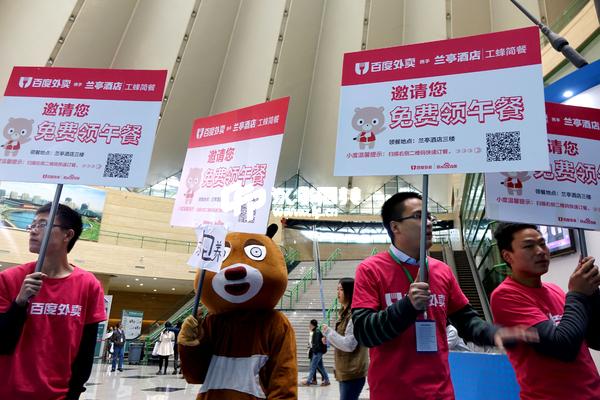 |
|
Staff of Baidu Waimai hold placards, reading "You're invited to enjoy a free lunch", in a convention center in Zhengzhou, Henan province. [Photo/China Daily] |
When Beijing was blanketed by heavy smog, three motorcycles passed by a crossroads within 30 seconds. All of them were carrying a big box, stuffed with food and bearing the name of one of China's three largest food-ordering platforms.
The motorcyclists were couriers from Ele.me, a six-year-old startup, Groupon-like Meituan.com and Baidu Waimai, a food-ordering service launched by search engine giant Baidu Inc.
They were winding through busy traffic to deliver dinners that consumers had ordered online.
The days-long smog is stoking demand for a business that is booming in China. Thanks to the proliferation of smartphones in the world's second-largest economy, a growing number of consumers are turning to mobile apps for catering services.
In the second quarter, online-to-offline, or O2O, catering industry transactions hit 8.2 billion yuan ($1.3 billion), up by 89 percent from last quarter, according to Beijing-based Internet consultancy Analysys International.
Although online food ordering only accounts for a small proportion of the catering industry, research company iResearch Consulting Group says its market volume is expected to hit 40 billion yuan in 2017, as more consumers develop the habit of booking meals online.
One of the main reasons for the rapid surge in China's online food ordering sector is a price war led by Internet companies.
"Currently, these online platforms are offering similar services in terms of partnered restaurants and delivery quality," said a venture capitalist who declined to be identified.
"Their differences are not big enough to lure customers away from competitors, so a powerful weapon is to launch a price war to vie for price-sensitive users."
So far, the strategy has worked. In October, Ele.me accounted for 33.4 percent of the market, while Meituan occupied the second position with 32.9 percent, closely followed by Baidu Waimai, which claimed 19.6 percent, data from Analysys International show.
However, winning market share purely through burning cash is not a sustainable strategy, experts said.
"Customers have no loyalty. They just choose platforms that offer the biggest discounts. When subsidies disappear, consumers are also likely to return to the traditional way of eating at bricks-and-mortar restaurants," said Liu Xuwei, an analyst at Analysys International.
To prevail in the end, market players need to improve and diversify their services as soon as possible, Liu said.
Kang Jia, co-founder and chief operating officer of ele.me, agreed, saying that the platform is expanding its food delivery services to five peak-time phases in one day.
"Unlike our peers which only focus on the regular three meals, we are adding desserts and snacks in the afternoon since most white-collar workers tend to have a tea break," Kang said. "Now around 19 percent of orders are for afternoon services."
The company is also rolling out special snacks to meet people's growing appetite late at night. "This is the most promising niche because it covers a long time range which starts from 8 pm to maybe 2 am the next day," Kang added.
While meituan.com is adding more resources to build up the inventory on its platform, Wang Huiwen, who is in charge of food delivery services at the company, said, "We are now taking steps to add more items such as fruit, flowers and other products sold at supermarkets."
